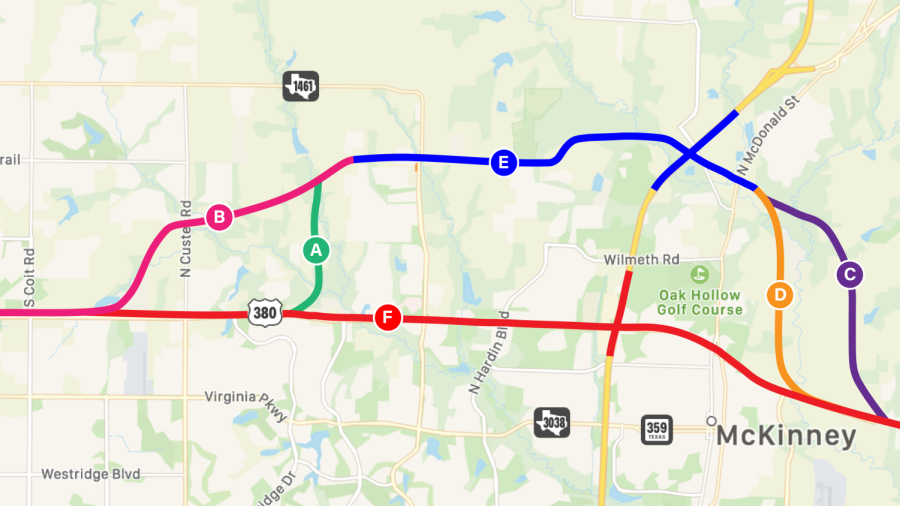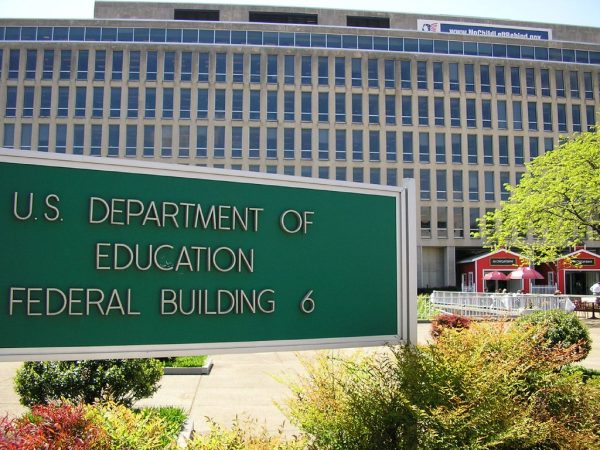TxDOT proposes new routes to US 380 bypass
Graphic created by Riley Gillum
TxDOT is currently in the process of creating the new proposed bypass for US 380 with construction beginning in a couple of years. “Each project’s purpose is to address the growing population in the Collin County area and make US 380 a free flowing highway for the safety of the current and future traffic,” Public Information Officer Madison Schein said. Featured is a graphic by Riley Gillum of US 380 showing the proposed alignments of US 380.
On Thursday, March 22, members of the Texas Department of Transportation (TxDOT) and the community met virtually for the upcoming construction of US 380 in Collin County. The meeting indicated that those in attendance from both the Town of Prosper and the City of McKinney had different ideas that opposed specific segments of the new bypass.
As of April 21, five segments would go through different cities in Collin County, including Prosper and McKinney.
“The section of US 380 between Coit Road and FM 1827 has five segments of proposed alternatives that the department is currently evaluating,” Public Information Officer Madison Schein said.
On Thursday, April 14, Prosper had a community pep rally for the opposition of Segment B, which would affect the residents of both Prosper and the neighborhood of Brookhollow. While Prosper opposed any alternate routes, the residents and nearby city McKinney had different ideas for the bypass of US 380.
“One [problem] is the number of children we have [in Brooke Hollow],” Sophomore Kayce Ford said. “I know there are 10+ kids alone that live on my street all under the age of six, [they] go out into the street and play or they have to go get a ball that rolled away, and they often don’t do a great job of looking both ways before crossing the street.”
McKinney, however, is currently against Segment A which affects the neighborhoods of Tucker Hill, a Rock Hill zoned neighborhood and nearby Stonebridge Ranch. According to the City of McKinney website, the city says they oppose Segment A because of how expensive it will cost taxpayers and how it would negatively impact the neighborhoods of Tucker Hill and Stonebridge Ranch.
“I feel that an additional segment would not assist traffic, especially in this hill-like area around Tucker Hill,” said Junior Ella Bermudez.
Alyssa Dickens, a Rock Hill student driver, says that the bypass could cause an inconvenience in her drive to school.
“Some of the alignments would cause my neighborhood to be surrounded by busy streets on three sides,” Junior Alyssa Dickens said. “While it could be beneficial in the future, the amount of construction and time it would take to implement would be a terrible inconvenience due to the route I take to get to school.”
Whether TxDOT goes with Segment A or B for construction, Heatherwood, one of the communities where some Rock Hill students live, would be significantly affected by either decision.
“The 380 bypass would affect me greatly as not only would I have to change my route to and from school, but I live on a street that backs up to the bypass, and so the noise would keep me up and lower property values near me,” freshman Caelan Fleske said.
According to Schein, a feasibility study completed in 2020 included some possible alternative routes starting in 2017. After the study, US 380 was divided into five different projects to address the drivers’ growing traffic and safety.
For the section of US 380 between Coit Road and FM 1827, TxDOT is now in the environmental impact study, which takes input and final reports from the feasibility study to analyze all possible alternatives. The environmental impact study draft report will be released in early 2023 for this section, along with a preferred alignment.
“Each project’s purpose is to address the growing population in the Collin County area and make US 380 a free-flowing highway for the current and future traffic safety and safety of the public,” Schein said.
US 380 helps connect different cities throughout Collin County, including Prosper, McKinney, Frisco, Princeton and New Hope to US 75, Denton County and Dallas North Tollway.
“US 380 is a highly traveled highway in Collin County and has been named a top priority for TxDOT and Collin County, [for] each section,” Schein said. “The department evaluates to see if it’s possible to stay on the original alignment or if a bypass is necessary.”
US 380 has increased, including areas around Preston Road and US 380. The Collin County website mentions that the intersection of Custer Road and US 380 saw an increase from 11,500 cars a day to 23,000 a day from a report of TxDOT’s Average Daily Traffic Count. Additionally, the site mentions a big portion of the population has seen a growth of 37.2% from the 2010 and 2020 censuses.
“Collin County grew by 43,000 residents from 2020-21, according to regional estimates,” Schein said.
According to TxDOT, there isn’t a date for constructing the new bypass of US 380. Currently, US 380 is still under an environmental impact study which could take another couple of years before initial construction begins for the bypass of US 380.
“I am a newly licensed driver, and 380 is a busy road, so the 380 bypass may be another way for me to get to Collin College, and I will also be able to get more experience on the freeway,” senior Madeleine Rowden said.
After contacting a town council member in the Town of Prosper, we have not received a response at this time.
Your donation will support the journalists of Hill Top Times and RH Media. Your contribution will help cover travel and registration costs needed for state and national conventions.

This is Jacob's third year on staff and he is a senior at Rock Hill. He is a part of Rock Hill Media and as well in the Rock Hill Band. He plays both the...











![A digitally constructed image shows money flowing out of a U.S. government building, representing the economic impact of the Trump administration’s new tariff policy. “[The tariffs are] supposed to basically pump up American businesses to where Americans go buy American products,” U.S. government teacher Adam Barclay said. “Then you have more manufacturing, you have more jobs, and that's how it's supposed to work.”](https://rockhillmedia.org/wp-content/uploads/2025/04/Impact-of-the-U.S.-Tariffs-1-600x338.png)
